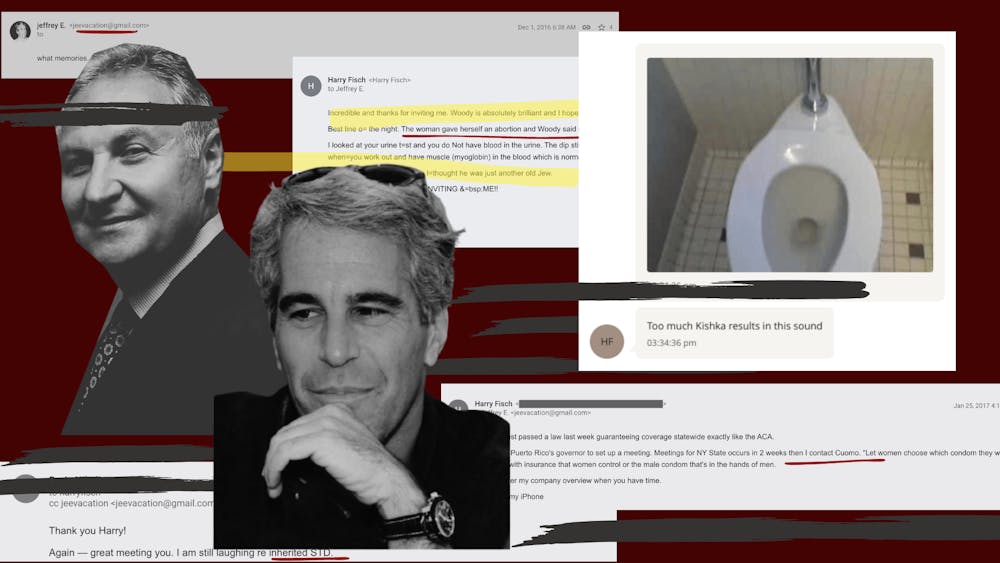Two days into the pro-Palestine encampment on the Arts Quad, international graduate students Bianca Waked and Momodou Taal were suspended for their participation.
Now, Cornell Graduate Students United - United Electrical, Radio and Machine Workers of America is arguing that since the University failed to bargain with the union prior to adopting the Interim Expressive Activity Policy, the policy is illegal. Thus, the union is asserting, the suspensions themselves were illegal, as Waked and Taal were penalized under the interim policy.
Taal, Waked and two other students were charged on Friday, April 26 with the unauthorized use of University property by engaging in or facilitating outdoor camping on the Arts Quad without approval, failure to comply with University directives to remove the unauthorized encampment, unreasonably loud chants and behavior, failure to disperse from the Arts Quad and staying past 8 p.m. on Thursday, April 25 — the initial deadline to leave given by administrators.
Taal and Waked are international students, meaning suspensions threaten their legal status in the country.
On Wednesday, Marguerite Pacheco grad, a member of the CGSU-UE Bargaining Committee, and Sadie Seddon-Stettler grad, a member of the CGSU-UE Contract Action Team, told The Sun that the University was required by law to negotiate over the interim policy with the union, since it constituted a change to working conditions as it is being used to discipline graduate students. The collective bargaining process includes the University’s bargaining committee and CGSU-UE’s elected Bargaining Committee.
The union was established in November to represent graduate workers across the University after an overwhelmingly positive 1,873 to 80 vote in the unionization election. This vote predated the initiation of the controversial interim policy in January. Under the National Labor Relations Act, employers cannot change wages, hours, working conditions or other mandatory subjects of bargaining without bargaining with the union to a point of agreement or overall impasse.
“Cornell can’t just make a new law, some new rule by which now it's illegal to do this and all these grad[uate] workers are now non-compliant and we get rid of them — that’s the legal idea there,” Pacheco said.
At a CGSU-UE press conference held on the Arts Quad at 1 p.m. on Wednesday, Jawaunna McAllister grad, a member of the CGSU-UE Bargaining Committee, said that the union demanded to bargain over the interim policy over a month ago. But instead of bargaining, the administration “decided to proceed full steam ahead” with the policy, McAllister said.
McAllister also described that the Math Department banned personal display items — including flags and personal decorations — from graduate student offices in February, without bargaining with the union.
“These policies, implemented without bargaining with our union, and enforced by Cornell’s provost, Michael Kotlikoff, are thinly veiled attempts to stifle inconvenient political speech from groups like the Coalition for Mutual Liberation and overall freedom of expression on our campus,” McAllister said.
CML — a coalition of over 40 on and off-campus organizations — organized the encampment.
Since the union is currently negotiating its grievance procedure, they plan to focus on arguing that the interim policy — and therefore its associated charges — was illegal from its initiation rather than focusing on the suspensions directly, Pacheco explained.
Grievance procedures in unionized workplaces refer to systems of trained individuals bringing workers’ grievances to management in a formal, constructive process. Seddon-Stettler said that the union has presented strong contract protections for graduate workers including discipline and dismissal guidelines as well as discrimination and harassment protections, since the beginning of March.
At 4:22 p.m. on Tuesday, April 30, the union sent an email to request to bargain the suspensions with the University with a 24-hour response deadline, according to Pacheco. At 6 p.m. on Thursday, May 2, Connor Davis grad wrote to The Sun that the University “is aware of our request to bargain but [has] not yet responded to it,” in a statement on behalf of the CGSU-UE Bargaining Committee.
Rebecca Valli, a representative of Cornell Media Relations, declined to comment on the University’s response to the email and CGSU-UE’s claims that the University violated the law.
“CGSU-UE is prepared to use the full force of our union to protect our workers, especially international grad[uate] workers who face unique challenges and employment precarity,” McAllister said. “All grad[uate] workers deserve academic freedom, workplaces free of non-discrimination and just discipline and discharge procedures — even international grad[uate workers], especially international grad[uate workers.]”

Julia Senzon is a member of the Class of 2026 in the College of Agriculture and Life Sciences. She is the editor-in-chief of the 143rd Editorial Board and was the managing editor of the 142nd Editorial Board. She can be reached at jsenzon@cornellsun.com or 908-672-3047.











